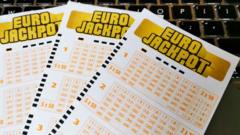Norwegian school leavers, known as "russe," have transformed graduation festivities into a whirlwind of celebration that raises alarm among parents and authorities. The iconic red overalls symbolize freedom and fun as students seek to balance party life with exam pressures. However, the ever-increasing popularity of "russebuss" parties—party buses that often operate from midnight onward—has prompted worries over the potential impact on academic success and mental health.
Selma Jenvin-Steinsvag, an 18-year-old student, alongside her friend Aksel, expressed excitement about the upcoming celebrations after completing their exams. Yet, for many, the festivities begin weeks in advance, creating a challenging environment for focus during exam periods. Edvard Aanestad, 19, shared his experiences of merriment, stating, "We go out every night for a month; we get drunk, we're partying with friends, and it's just fun!"
While the celebrations indeed add vibrancy to the pre-national holiday atmosphere, they have sparked conversations around binge drinking, drug use, and sleep deprivation. Parents have expressed concern that these festivities lead to harmful outcomes, with many teenagers feeling excluded due to financial barriers associated with party bus costs.
In response to growing worries, Prime Minister Jonas Gahr Støre acknowledged that the russe culture had escalated, calling for a reassessment of the celebrations. Solveig Haukenes Aase, a concerned parent, highlighted that these party dynamics impact not only high school seniors but also younger teenagers. Aase's advocacy group aims to create safer environments for youth amid these pressures, recognizing a shift in perspective among educators regarding the influence of the russe phenomenon.
Education Minister Kari Nessa Nordtun emphasized the intertwining of celebration and examination periods, noting that excessive partying hampers students' concentration and performance in school. The emphasis on safety and inclusivity has prompted discussions about revamping graduation celebrations to post-exam periods, addressing both the financial strains on families and the emerging culture of exclusivity within the bus groups.
Beyond parental concerns, the dangers posed by inappropriate bus dynamics such as sideways-facing seats and standing room have prompted transport officials to advocate for safer bus practices. The government has proposed changes that have been met with resistance from students who fear that stricter regulations will reduce access and enjoyment of the experience.
Reflecting on this dilemma, Edvard categorically stated that limiting bus sizes would perpetuate exclusion rather than alleviate it, emphasizing that many students save for years to partake in these beloved celebrations. As Norwegian society grapples with the consequences of this party culture, the future of the russe tradition stands at a crossroads, with the hope of creating a safer and more inclusive environment for all.
Selma Jenvin-Steinsvag, an 18-year-old student, alongside her friend Aksel, expressed excitement about the upcoming celebrations after completing their exams. Yet, for many, the festivities begin weeks in advance, creating a challenging environment for focus during exam periods. Edvard Aanestad, 19, shared his experiences of merriment, stating, "We go out every night for a month; we get drunk, we're partying with friends, and it's just fun!"
While the celebrations indeed add vibrancy to the pre-national holiday atmosphere, they have sparked conversations around binge drinking, drug use, and sleep deprivation. Parents have expressed concern that these festivities lead to harmful outcomes, with many teenagers feeling excluded due to financial barriers associated with party bus costs.
In response to growing worries, Prime Minister Jonas Gahr Støre acknowledged that the russe culture had escalated, calling for a reassessment of the celebrations. Solveig Haukenes Aase, a concerned parent, highlighted that these party dynamics impact not only high school seniors but also younger teenagers. Aase's advocacy group aims to create safer environments for youth amid these pressures, recognizing a shift in perspective among educators regarding the influence of the russe phenomenon.
Education Minister Kari Nessa Nordtun emphasized the intertwining of celebration and examination periods, noting that excessive partying hampers students' concentration and performance in school. The emphasis on safety and inclusivity has prompted discussions about revamping graduation celebrations to post-exam periods, addressing both the financial strains on families and the emerging culture of exclusivity within the bus groups.
Beyond parental concerns, the dangers posed by inappropriate bus dynamics such as sideways-facing seats and standing room have prompted transport officials to advocate for safer bus practices. The government has proposed changes that have been met with resistance from students who fear that stricter regulations will reduce access and enjoyment of the experience.
Reflecting on this dilemma, Edvard categorically stated that limiting bus sizes would perpetuate exclusion rather than alleviate it, emphasizing that many students save for years to partake in these beloved celebrations. As Norwegian society grapples with the consequences of this party culture, the future of the russe tradition stands at a crossroads, with the hope of creating a safer and more inclusive environment for all.



















